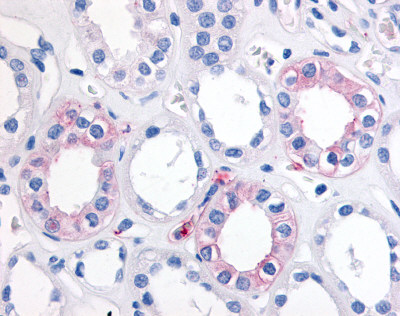EPHX2
Frequently bought together (3)
Transient overexpression lysate of epoxide hydrolase 2, cytoplasmic (EPHX2)
USD 396.00
Other products for "EPHX2"
Specifications
| Product Data | |
| Applications | IHC |
| Recommended Dilution | IHC IHC-P (10 - 20 µg/ml) |
| Reactivities | Human |
| Host | Rabbit |
| Clonality | Polyclonal |
| Immunogen | Synthetic 18 amino acid peptide from internal region of human EPHX2. Percent identity with other species by BLAST analysis: Human, Gorilla (100%); Gibbon (94%); Monkey (83%). |
| Specificity | Human EPHX2. BLAST analysis of the peptide immunogen showed no homology with other human proteins, except RHOBTB2 (44%), RHOBTB1 (44%). |
| Formulation | PBS, 0.1% Sodium Azide |
| Concentration | lot specific |
| Purification | Immunoaffinity purified |
| Conjugation | Unconjugated |
| Storage | Aliquot and store undiluted at -20°C or below for up to 1 year. Can be stored undiluted at 4°C for up to 1 month. Avoid freeze-thaw cycles. |
| Stability | 12 months from date of despatch |
| Gene Name | epoxide hydrolase 2 |
| Database Link | |
| Background | Epoxide Hydrolase 2 antibody TA341174 is an unconjugated rabbit polyclonal antibody to human Epoxide Hydrolase 2 (EPHX2) (Internal). Validated for IHC. Tested on 20 paraffin-embedded human tissues. |
| Synonyms | EPHX2, CEH, Epoxide hydratase, Epoxide hydrolase, soluble, Epoxide hydrolase 2, cytosolic, SEH, Soluble epoxide hydrolase |
| Note | Immunohistochemistry: The unconjugated form was validated for use in immunohistochemistry on a panel of 21 formalin-fixed, paraffin-embedded (FFPE) human tissues after heat induced antigen retrieval in pH 6.0 citrate buffer. After incubation with the primary antibody, slides were incubated with biotinylated secondary antibody, followed by alkaline phosphatase-streptavidin and chromogen. The stained slides were evaluated by a pathologist to confirm staining specificity. The optimal working concentration for the unconjugated form was determined to be 20 ug/ml. |
| Reference Data | |
| Protein Pathways | Arachidonic acid metabolism, Metabolic pathways |
Documents
| Product Manuals |
| FAQs |
| SDS |
{0} Product Review(s)
0 Product Review(s)
Submit review
Be the first one to submit a review
Product Citations
*Delivery time may vary from web posted schedule. Occasional delays may occur due to unforeseen
complexities in the preparation of your product. International customers may expect an additional 1-2 weeks
in shipping.






























































































































































































































































 Germany
Germany
 Japan
Japan
 United Kingdom
United Kingdom
 China
China




